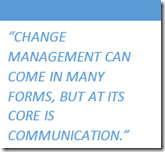How can an IT Pro make a tangible business impact?
The following post was contributed by Alan Richards, Senior Consultant at Foundation SP and SharePoint MVP.
Business and IT are inextricably linked, there is no denying the fact and if that’s the case then the IT Professional has a big part to play in the success of the business.
I am employed as Senior Consultant at Foundation SP which means I get dropped into a lot of different businesses who are looking to maximise their use of IT to benefit the business as a whole, but what skills do I have that means I can make a difference to the business?
Let me first give you an insight into my career, I have worked for 19 years in IT with 18 of those spent in education and the last year working for an IT Consultancy. I have various Microsoft certifications and for the last 3 years I’ve been proud to be a Microsoft MVP in the SharePoint discipline. So I think my IT skills are OK but how is that going to make an impact in a business environment apart from the obvious of keeping everything running, which let’s face it just costs the business money, it doesn’t actually generate income.
But can IT generate money for a business, or more pointedly can it generate tangible, account auditing income? To be honest I don’t think so. What IT can do is ensure that the people in a business who do generate income have the tools to be able to generate that income and that is where an IT Professional needs some additional skills on top of the usual ‘IT ones’.
When I go into businesses I am not being brought in because my skills are any better than their in-house IT team, it’s because I bring a different skillset, a skillset that to an extent has nothing at all to do with my IT skills. The skillset I bring is more about being able to understand the business’s needs, what it wants to achieve in both the short and long term. These skills are more about listening to the people in the business, both the directors but more importantly the people at the ‘coal face’ because, let’s face it, the directors can shape a business but it’s the workers who will generate the income, so if you make life easy for them then the business will thrive.
So let’s assume you’re an IT Professional who has the required skills and you have listened to all sections of the business to understand their needs and you discover a set of technologies that will massively increase the profits  for the business but it’s going to bring quite a bit of change. It’s a phrase that is used a lot but ‘change management’ is one of the skills that is often overlooked, but is probably one of the most important. Any IT Professional can make changes, introduce new technologies but the IT Professional that can bring the business along as they make the changes will be the most successful. No one likes change, that’s a fact, so as an IT Professional you need to ensure that the change is managed, that users feel happy with the change, that they understand the reasons for the change and they can see the long term benefits. If you manage all that then not only will the business flourish but you will also benefit from happy users.
for the business but it’s going to bring quite a bit of change. It’s a phrase that is used a lot but ‘change management’ is one of the skills that is often overlooked, but is probably one of the most important. Any IT Professional can make changes, introduce new technologies but the IT Professional that can bring the business along as they make the changes will be the most successful. No one likes change, that’s a fact, so as an IT Professional you need to ensure that the change is managed, that users feel happy with the change, that they understand the reasons for the change and they can see the long term benefits. If you manage all that then not only will the business flourish but you will also benefit from happy users.
Change management can come in many forms, but at its core is communication. An IT Professionals ability to communicate is core to success. My role when I work with companies is normally to understand the business and recommend ways to improve processes or new technologies that will improve efficiency and the ability of users to carry out their duties easier and in some cases remotely. After the business directors have bought into the ideas the next and most important job is to ensure the workforce buy in as well, without that buy in nothing will ever improve. You can introduce as much new technology as you like but if you don’t communicate the change effectively then the users will become unhappy, disenfranchised and ultimately less effective for the business.
The title of this article asked about the skills needed to make a tangible impact on a business, for me the core skill outside of the obvious IT skillset has to be communication, which hopefully the text above illustrates. If you get communication right, whether it be by email, training or workshop then the rest such as change management will follow.
Do you agree with Alan that the ability to adapt to change is one of the most prominent skills in our environment? What other impactful skills should be included? Let us know in the comments section or via @technetuk.
